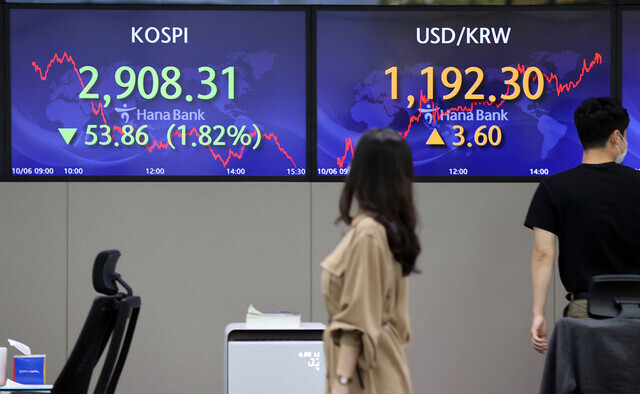hankyoreh
Links to other country sites 다른 나라 사이트 링크
KOSPI hits 12-month low, won falls to weakest point against dollar in 14 months

Shocks to the domestic financial market on Wednesday showed no signs of ebbing as the benchmark Korea Composite Stock Price Index (KOSPI) came close to falling below the 2,900-point mark and the Korean won rose to the 1,190 level against the dollar for the first time in 14 months.
The main factors driving the falling number are lingering jitters over energy-related inflation compounded by real estate fears in China.
The KOSPI saw signs of recovery in the morning by recuperating to the 3,000 mark, but eventually starting falling and undid its recovery in the afternoon. The index fell 1.82% or 53.86 points to finish at a 12-month low of 2,908.31.
Net sales by foreign investors reached a modest 278.1 billion won (US$233 million), but weak demand from individual investors continued.
The KOSDAQ saw its biggest fall of the year of 3.46% or 33.01 points.
On the Seoul foreign exchange market, the won depreciated, rising 3.6 won against the dollar to finish at 1,192.3, the first time since Aug. 4 last year (1,194.1) that the domestic currency weakened to the 1,190 level.
In the US, the New York market saw a technical rebound, but the sluggishness of the financial market remained unchanged. The price of West Texas Intermediate crude oil neared US$80 per barrel, rising 1.7% to US$78.93. That of natural gas (futures) saw its biggest surge since December 2008 of 9.5% due to widespread shortages of the fuel that started in Europe and Asia and are now reaching the US.
Yields on 10-year US government bonds exceeded 1.5% again due to energy-triggered inflation, and the dollar showed signs of strengthening for the first time in four trading days.
Fears that rising interest rates and inflation could end the 18-month stock rally swirled on Wall Street.
More bad news hit the stock market over fears of another real estate developer in China being in danger of default. Bloomberg reported that the mid-size Fantasia Holdings Group’s credit rating was downgraded to the default level after failing to repay a US$205.7 million bond. S&P said the group's asset disposition progressed slower than expected, thus preventing the timely securing of liquidity.
Yet Fantasia's effect on the market is expected to be less than that of Evergrande Group due to the difference in the size of the two developers. Fantasia Holding’s Group's liabilities are an estimated US$12.9 billion, a far cry from Evergrande's US$300 billion.
SK Securities analyst Lee Jae-yoon said, "KOSPI's rebound isn't gaining strength because factors recently suppressing the market such as difficulties in negotiating the US debt ceiling, anxiety in China and disruptions in the supply chain have not been fundamentally resolved."
By Han Gwang-deok, finance correspondent
Please direct questions or comments to [english@hani.co.kr]

Editorial・opinion
![[Column] Season 2 of special prosecutor probe may be coming to Korea soon [Column] Season 2 of special prosecutor probe may be coming to Korea soon](https://flexible.img.hani.co.kr/flexible/normal/500/300/imgdb/original/2024/0426/3317141030699447.jpg) [Column] Season 2 of special prosecutor probe may be coming to Korea soon
[Column] Season 2 of special prosecutor probe may be coming to Korea soon![[Column] Park Geun-hye déjà vu in Yoon Suk-yeol [Column] Park Geun-hye déjà vu in Yoon Suk-yeol](https://flexible.img.hani.co.kr/flexible/normal/500/300/imgdb/original/2024/0424/651713945113788.jpg) [Column] Park Geun-hye déjà vu in Yoon Suk-yeol
[Column] Park Geun-hye déjà vu in Yoon Suk-yeol- [Editorial] New weight of N. Korea’s nuclear threats makes dialogue all the more urgent
- [Guest essay] The real reason Korea’s new right wants to dub Rhee a founding father
- [Column] ‘Choson’: Is it time we start referring to N. Korea in its own terms?
- [Editorial] Japan’s rewriting of history with Korea has gone too far
- [Column] The president’s questionable capacity for dialogue
- [Column] Are chaebol firms just pizza pies for families to divvy up as they please?
- [Column] Has Korea, too, crossed the Rubicon on China?
- [Correspondent’s column] In Japan’s alliance with US, echoes of its past alliances with UK
Most viewed articles
- 1Is Japan about to snatch control of Line messenger from Korea’s Naver?
- 2‘We must say no’: Seoul defense chief on Korean, USFK involvement in hypothetical Taiwan crisis
- 3[News analysis] Using lure of fame, K-entertainment agency bigwigs sexually prey on young trainees
- 4Will NewJeans end up collateral damage in internal feud at K-pop juggernaut Hybe?
- 5‘Weddingflation’ breaks the bank for Korean couples-to-be
- 6No good, very bad game for Korea puts it out of Olympics for first time since 1988
- 7AI is catching up with humans at a ‘shocking’ rate
- 8“Korea is so screwed!”: The statistic making foreign scholars’ heads spin
- 9The dream K-drama boyfriend stealing hearts and screens in Japan
- 10[Column] The clock is ticking for Korea’s first lady